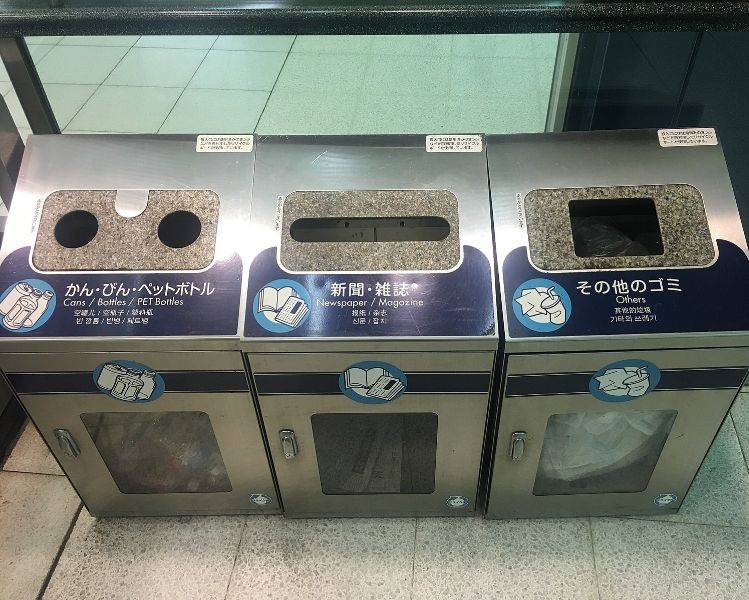Where can I dump this? - Trash in Japan
Friday, September 6, 2019
Why there are few public trash cans in Japan and how the average Japanese person handles their trash.

It is a common sight for sports enthusiasts. Japanese fans leaving their part of the stadium as clean as if they had never been there. Every World Cup this spirit of common cleanliness evokes praise by foreign media for showing respect to shared public spaces. Coming to Japan from countries with an abundance of public waste disposals one might not be surprised to find the streets neatly clean with almost no trash cans around.
Compared to cities like Berlin or New York with countless overflowing trash bins, how is it possible that for example Tokyo or Nagoya are so much cleaner with so much fewer chances to dump trash?
One historic incident is usually stated as the trigger for the lack of trash cans in Japan. In 1995 five members of the doomsday cult Aum Shinrikyo released the nerve agent Sarin during the rush hour in Tokyo’s subway trains, resulting in twelve people dead and more than 5000 injured. In the wake of this shocking event a great number of trash cans in highly frequented places were removed. The increase in security measures could recently be felt during the visit of US President Trump to Japan in May 2019. Across the country trash cans in train stations and airports were sealed shut until the end of the visit.
The procedure to remove possible hiding spots for dangerous goods however is not limited to Japan only. After the Twin Tower attacks of 9/11, after the Boston Marathon bombing 2013 and during the IRA terror streak in the UK for example trash cans were removed as well and only later (if at all) reinstalled.
The answer to the question „Where can I dump this?“ is of course not that simple. A closer look at the Japanese daily and cultural life shows, that keeping spaces clean is not only a matter of security but of individual responsibility.
It starts with the upbringing. Part of the Japanese school education, from first grade onward, is to have students clean their own classrooms and school facilities. Not as a means to save money, but to raise children with the sense of a shared responsibility for public spaces. This duty called Gakko Soji (school cleansing) is not only taught by teachers to students but by older students to younger students as well. That way the younger ones have some kind of role model to adjust to besides adults. In this early age Japanese children are brought up with the understanding that a dirty community is as bad as a dirty individual.

This cultural practice makes it easy to understand why it is so common in Japan to pay respect to your surroundings. Taking off your shoes before entering a home or restaurant, clean toilets with separate slippers but no toilet brush, immaculate public transportation systems like the Shinkansen or buses. All of this is just an extension of cleaning up as a shared duty.
But even with this kind of upbringing, how comes, that it is so hard to find a public trash can? Of course, there are trash bins around in parks, supermarkets, and train stations. A lot of them can be found next to the famous vending machines. They are colorful, always functional and well equipped with a sheer endless variety of hot and cold drinks or corn soup. Japan has one of the highest densities when it comes to vending machines worldwide and they are one of the most likely spots when looking for a trash bin. Most of them though are exclusively for bottles and cans and one will barely find them stuffed with anything but that.
Another spot for dumping trash in public are the 24/7 convenience stores called ´konbinis´. They offer almost everything you might look for. From fresh food in high quality, snacks and drinks to technical, household and school supplies. Inside or outside every convenience store, there are enough trash cans to dispose waste. Usually these are only to be used by customers so one should be considerate enough to buy something, before throwing away trash.
If there aren´t any trash cans around another way of not littering the streets is to use one of the plastic bags japanese stores hand out to every customer. That way the trash is not leaking in handbags nor is it thrown away. Even though these bags might seem like additional trash, they are really useful, when on trains or buses.
Of course there are certain areas in every big japanese city, that are not perfectly clean. Shinjuku and Namba, the famous entertainment districts in Tokyo and Osaka, are much more littered than less crowed spots. As tourist attractions and gathering places for the japanese and international youth the city governments try to find a way to keep the streets clean without changing much about the Status Quo. One example of these measures is the ban of drinking alcohol in public spaces around Shibuya station on Halloween 2019. Even convenience stores are asked to refrain from selling alcohol during the prohibition. This legislation made by the Shibuya ward followed an significant increase in vandalism around Shibuya on Halloween nights in the last years. To cope with this situation in an area with a high frequency of party locations as bars and pubs the ban might also be extended to New Year´s and major sporting events.
To actually witness acts of vandalism in public spaces definitely are the exception in Japan so even if it might be inconvenient to carry around waste in plastic bags and search for trash cans while hiking, sight-seeing or meeting friends, there is no other way than to get used to it and join the common duty of keeping the public clean as much as possible. Hopefully there won´t be so much waste to carry around in the future anyway, in Japan as well as the rest of the world.
----------------------------------------------
About the Author

Growing up as an avid reader I started writing stories at an early age and never stopped. After spending a great deal of my life in Berlin, immersing myself in its lively, pulsing atmosphere, I moved to Japan in 2019 to experience new adventures and seek inspiration. When I don´t write short stories and novels, I work as a freelance journalist covering diverse topics. (Homepage: https://christiandamerow.wixsite.com/meinewebsite)








